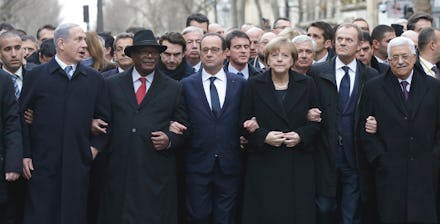Here’s What Everyone Who’s Blaming Obama for Not Going to Paris Is Getting Wrong

Sunday's "unity" march in Paris brought millions of ordinary citizens into the streets to declare their solidarity following the deadly terrorist attacks against the offices of the satirical newspaper Charlie Hebdo and a Kosher supermarket last week.
World leaders were there: An estimated 40 from around the globe made the trip. The enduring images from Sunday's rally feature an unlikely assembly of heads of state: German Chancellor Angela Merkel was at the front of the pack alongside French President Francois Hollande; both Palestinian President Mahmoud Abbas and Israeli Prime Minister Benjamin Netanyahu were present as well.
There was, however, one very notable absence: President Barack Obama. Neither he nor any top cabinet officials joined the rally. Vice President Joe Biden was at home, while Secretary of State John Kerry was visiting India and Attorney General Eric Holder, in Paris, had prior engagements. In the end, U.S. Ambassador Jane Hartley was the only American official on hand for the march.
The absence of a high-ranking American official at the rally made a lot of people back in the U.S. very, very upset. By early Monday afternoon, the White House broke down and apologized. "I think it's fair to say we should have sent someone with a higher profile," Press Secretary Josh Earnest told reporters.
Earnest's concession might quiet some of Obama's critics, but in apologizing he glossed over the simple fact that the president was right to steer clear of what, apart from the organic attendance of millions of well-meaning Parisians, quickly descended into a political charade.
The backlash: "By not attending the unity rally in Paris on Sunday, President Obama has missed an opportunity to show leadership, to demonstrate that Americans are as committed to fight against terrorism as anyone in the world," conservative contributor Stuart Anderson wrote for Forbes.
From there, right-wing opinion outlets and assorted cable news outrage-generators declared the president's decision a stain on the republic. The New York Daily News upped the stakes, suggesting that Obama had "let the world down," with columnist Mike Lupica sighing that "the United States of America should have been at the front of that line, and was not."
On Twitter, it was more of the same. The scent of political blood was in the water, and the sharks swam out to meet it:
So it continued all through the night and into Monday, with the president's opponents working feverishly to make political hay over his no-show in Paris.
"Unity" with whom? For Obama, the roster of rogues and autocrats lining up to co-opt the people's march should have been reason enough to stay home. If flying seven hours for the opportunity to lock arms with the likes of Jordan's King Abdullah or race-baiting former French President Nicolas Sarkozy is what it takes to satisfy pundits' thirst for a sexy episode of American leadership, then the White House took the braver option.
In this environment, "unity" is only as valuable as the men or women with whom you are unifying. The French political class itself had a minor meltdown over whether or not to invite right-wing National Front leader Marine Le Pen. Imagine the dizzying outrage spiral Obama would have set off had he allowed himself to be pictured arm-in-arm with Abbas. One wrong step and the headlines today would have been singing the same nonsense, just in a different key.
The reality is that these leaders and their countries are not united. They're not "Charlie." Nor are they "Ahmed." They are are not united against terrorism, Islamic or otherwise, and certainly not in favor of any kind of real free press. The French, especially, are deeply divided. What's truly on the march today in France and Europe is Islamophobia and anti-Semitism. So, while it's surely nice to see all those well-meaning millions out for a Sunday stroll together, it was simply that — a walk in the park.
Actions matter: During his first run for president, Obama ruffled this same section of the commentariat by reversing course and refusing to wear the flag pin that had become de rigueur for American politicians in the aftermath of the Sept. 11, 2001, attacks.
"Right after 9/11, I had a pin," Obama said in an October 2007 interview with KCRG-TV in Cedar Rapids, Iowa. "That became a substitute for, I think, true patriotism, which is speaking out on issues that are of importance to our national security."
"I decided I won't wear that pin on my chest," he continued. "Instead, I'm going to try to tell the American people what I believe will make this country great, and hopefully that will be a testament to my patriotism."
On Sunday, Obama showed that he didn't care for the political charade unfolding in Paris. And in his absence, he refused to perpetuate the idea that grand gestures — whether they come in the form of a mass rally or a hashtag or timely photo op — are more meaningful than small actions. No apologies necessary.
Correction: Jan. 12, 2015